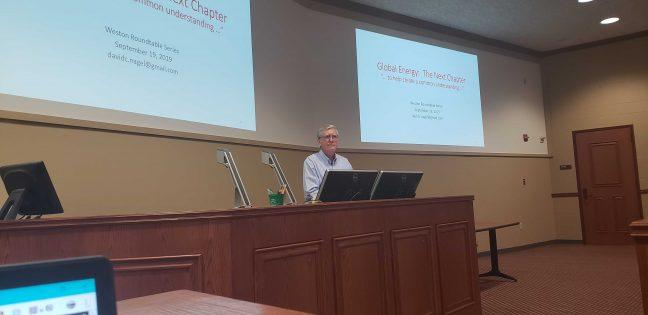A University of Wisconsin alumnus spoke Thursday about the history and future of global energy and fossil fuels.
David Nagel is a retired executive director of BP America, a cofounder of the nonprofit Forum 2100 and a board member on Our Energy Policy. His presentation, as part of the Weston Roundtable lecture series, explored the history of global energy sources and climate, while also discussing current energy concerns and potential energy sources for the future.
Nagel said the Industrial Revolution, a period of time between 1760 and 1960, brought both technological advancements and increased pollution. During this time, oil and electric energy powered advancements in transportation, heating and industrial systems. It also heralded a massive population growth, growing from 0.8 billion people in 1760 to 3 billion in 1960. The presence of atmospheric CO2 grew from 280ppm to 317ppm, as people began to burn more fossil fuels.
In 1965, the world consumed 3,703 toe (“toe” stands for “tonne of oil equivalent” — a large-scale unit of energy) of energy, 96% of which came from burning fossil fuels, Nagel said. On the global stage, Nagel said the U.S. consumed a large share of that energy.
“In 1965, the U.S. consumed basically one third of the world’s energy,” Nagel said. “The U.S. was the only one that relied most heavily on oil.”
But by 2018, Nagel said China overtook the U.S. as the top energy consumer. And global fossil fuel use continued to grow dramatically between 1990 and 2018 — from 7,175 toe to 11,740 toe now.
UW professor describes importance of sustainability to indigenous Arctic communities
Nagel outlined three concerns people have with energy: security, affordability and environmental friendliness. He said some people tend to be more concerned about one factor than another — some people want to make sure their energy is secure no matter what, while others want clean energy despite affordability or security risks.
“Some will care more about energy security, some will care more about environmental impacts,” Nagel said.
Nagel talked about three types of changes modern society might see in the future. Incremental changes are small changes like implementing electric cars, while step changes are slightly larger changes like a carbon tax and new, more sustainable business designs. Finally, reactive changes are major lifestyle changes that may come as people adapt to a changing environment, like physical relocation.
He said each of these changes will be important, even incremental changes.
“Even though they’re small improvements, over time they build up,” Nagel said.
When asked about what an individual who wants to lead a more sustainable life can do, Nagel spoke about carbon footprints and collecting data for a larger education effort. A carbon footprint is the impact an individual has on their environment — leaving a lower-waste, more sustainable lifestyle can reduce an individual’s carbon footprint.
Nagel said a greater educational effort will be important in figuring out the impact an individual can have on their environment. He said collaborative data collection can help everyone learn together how to lead more sustainable lifestyles.
“I think part of it is together, learning, collecting data,” Nagel said.
On the other hand, when asked about the responsibility of corporations like BP to lead sustainability efforts, Nagel said corporations will have to work towards step changes.
Nagel said corporations will have to adapt and continually improve their sustainable energy consumption, to stay afloat in a competitive market.
UW expert looks to encourage students to fight for cleaner future
“They have a role to play, but they’re not gonna go out of business because there’s not enough oil or gas,” Nagel said. “They’re gonna have to deal with the challenges.”
Though Nagel said energy use is a huge cause of fossil fuel emission — about 74% of fossil fuel emissions are from energy use — other sectors like agriculture, industry, waste management and land management all contribute to fossil fuel emissions as well.
“Energy is not the only source of human induced emissions,” Nagel said.
Overall, Nagel said energy has been a growing problem since the Industrial Revolution, and as the global population increases and new global economies emerge, societies will adapt, or be forced to react to change.
Nagel said though some people have different ways of approaching this issue than others, the future of energy is important to everyone.
“Who would want to live in a world where energy was scarce, or expensive, or had negative environmental impacts?” Nagel asked.





















